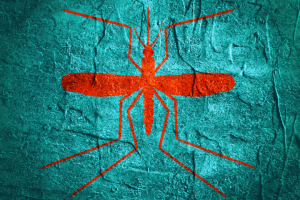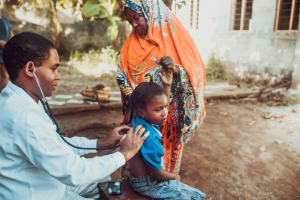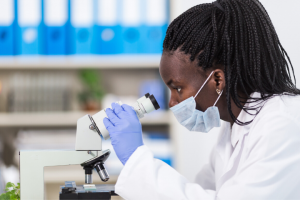The African Academy of Sciences Fellow in Chemical sciences, Prof Ameenah Gurib Fakim, was the sixth President of the Republic of Mauritius, and was one of just 13 women out of a total of 178 heads of state in the world. In Africa she and President Ellen Johnson-Sirleaf of Liberia, were the only two women heads of state in Africa at the time. She explains how this is not just an African problem, but a global problem. To rectify it, we need all the world’s leaders to empower women, not just the world’s women leaders empowering other women.
In this blog, Delesa Damena, an Ethiopian geneticist at the Developing Excellence in Leadership and Genetics Training for Malaria Elimination, describes the major challenges of the global malaria eradication efforts, what inspired him as a youngster to pursue a career in scientific research and how a comprehensive understanding of the genetic basis of resistance of severe malaria can potentially inform the development of new treatments and vaccines.
This month marks two years since the launch of AAS Open Research. We have taken this opportunity to reflect on the impact and development of the platform over the last two years and to look forward to the future.
Neglected Tropical Diseases (NTDs) have always been a part of Professor Francisca Mutapi’s life, even from a young age growing up in Zimbabwe, where NTDs are prevalent. Now, an AAS Fellow in Biosciences, Co-Director Global Health Academy, Deputy Director Tackling Infections to Benefit Africa (TIBA), she is shaping national and global policies around them. In this blog, she talks about her global family, the one she found being part of the AAS fellowship, and all the nurture and support that family provides in helping build a science career.
From an early age, Professor Catherine Jane Ngila, AAS Fellow in Chemical Sciences, felt discriminated against by her culture just for being a girl. In this blog, she discusses the challenges she has faced and how she is using her platform as an AAS Fellow, to inspire the next generation of women in STEM.
Kanyiva Muindi, is an Associate Research Scientist and a FLAIR Research Fellow at the African Population and Health Research Center (APHRC). She won her FLAIR grant through her drive to make a difference to the lives of women in her county and eventually across the African continent. In this blog, she tells us about her FLAIR Fellowship work, where she rolled out an ethanol cookstove intervention in a rural community in Kenya to reduce household air pollution.
Tiny technology with life-changing potential for communities. Nanotechnology researcher, Anita Etale, Global Climate Change Institute at the University of the Witwatersrand, Johannesburg, is a FLAIR (Future Leaders – African Independent Research) funded recipient. She used her FLAIR funding to research the use of nanomaterials to produce clean water from the contaminated supply produced from mine draining. Here’s her research journey from material investigation to community engagement.
The peer review model at AAS Open Research involves formally invited peer review after publication, which is fully open and transparent, and led by the article authors. In this blog, Jeniffer Jeyakumar, Senior Editorial Assistant at F1000Research, helps you decide whether you should accept that review request.
Dr. Evelyn Gitau, Director of Research Capacity Strengthening at the African Population and Health Research Center, introduces the new Gateway for the research institution on AAS Open Research.
The first phase of the DELTAS Africa programme is near completion, so sights are now set on the second phase. In this Q&A with Alphonsus Neba, and Susan Gichoga, The AAS, we find out why the DELTAS Africa programme was established, how it works, and what this second phase hopes to achieve.









